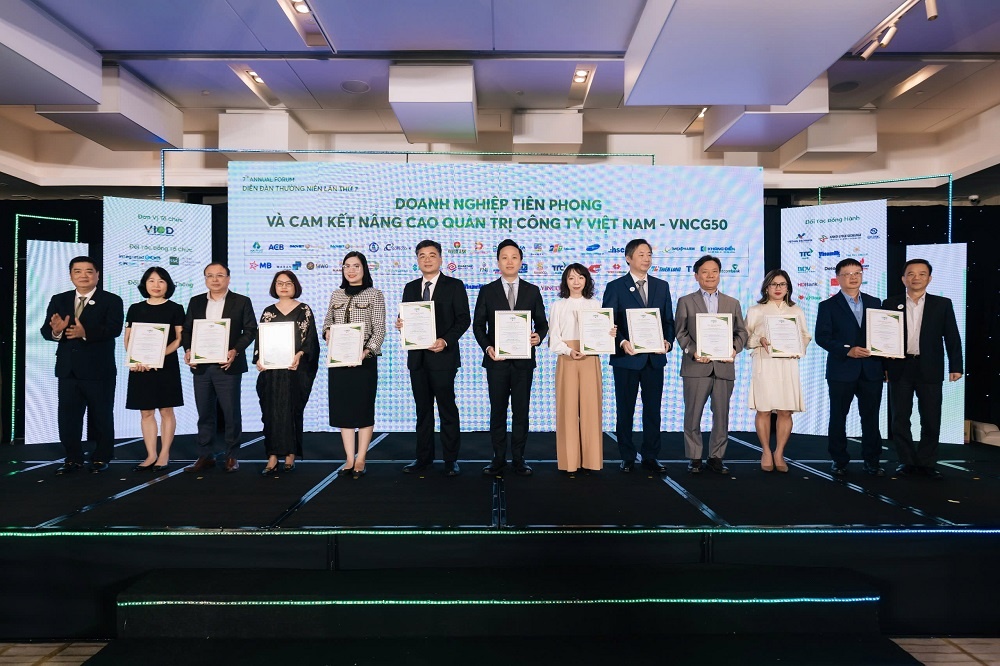Vietnamese firms must strengthen ESG policies to attract investment
 |
| Experts discussing the importance of corporate governance at the forum |
The event, supported by VIR as its media partner, aimed to enhance transparency and attractiveness in Vietnam’s financial and securities markets, particularly as the country prepares for a potential stock market upgrade in 2025.
The forum highlighted the critical role of corporate governance in driving sustainable development and meeting the growing expectations of global investors. As demands for effective governance tied to Environmental, Social, and Governance (ESG) standards continue to rise, businesses are under increasing pressure to adopt international best practices.
"Improved governance frameworks are not just about meeting regulatory requirements. They are essential for attracting responsible investors who prioritise long-term value creation," said Kasturi Nathan, head of Risk Advisory Services at Deloitte Malaysia.
She emphasised that in today’s interconnected and volatile markets, trust and accountability are pivotal.
"Robust governance frameworks act as signals of credibility, which is indispensable for building investor confidence," she said.
Despite progress, Vietnam’s corporate governance standards remain among the lowest in ASEAN, ranking below the regional average on the ASEAN Corporate Governance Scorecard (ACGS).
Nathan noted that bridging this gap is crucial for Vietnam to strengthen its competitive edge and secure sustainable investment.
"This is not just about compliance; it is about aligning with global standards to meet the expectations of increasingly discerning investors," said Nathan.
Corporate governance has become a key measure of a company’s competitiveness. It reflects a business’s ability to build trust with markets, suppliers, and stakeholders while addressing critical environmental and social challenges. "Governance is the foundation for transparency, accountability, and the effective implementation of sustainable strategies," Nathan explained.
This aligns with Vietnam’s commitment to achieving net-zero emissions by 2050, a goal that has intensified the focus on green financing and governance.
Nguyen Thuy Hanh, CEO of Standard Chartered Vietnam, highlighted how her organisation integrates fairness, risk management, and ethical practices into its operations.
"At Standard Chartered, these principles guide everything we do - from developing financial solutions to recruitment policies," said Hanh.
The bank has developed frameworks for green and sustainable financial products, including transition bonds, to support businesses in their sustainability journeys. "Green financing, particularly through debt and bonds, plays a pivotal role in accelerating the transition to a green economy," Hanh added.
A reputation for excellence in corporate governance can pull in investment and act as a driver for resilience and competitiveness.
Tran Ngoc Nguyen, chairman of PetroVietnam Ca Mau Fertiliser, emphasised that good governance ensures capital is used wisely and builds investor trust. He pointed out four critical elements of governance: fairness, transparency, accountability, and control.
"Investors want to see how companies manage their resources and whether their strategies align with sustainable value creation," Nguyen said.
Over the course of seven rounds of ACGS evaluations, Vietnam has made incremental improvements, but significant challenges remain.
Regulators and businesses alike recognise the need for deeper, actionable programmes to align with international standards. Nguyen called for stronger collaboration between the public and private sectors to raise governance standards and instil investor confidence.
At the forum, VIOD introduced the VNCG50 Scorecard, a groundbreaking initiative designed to identify and benchmark 50 leading Vietnamese companies committed to the best governance practices.
The scorecard, based on ACGS criteria and tailored to Vietnam’s business environment, aims to close the governance gap between Vietnam and its ASEAN peers.
 |
| Phan Le Thanh Long, CEO, VIOD |
Phan Le Thanh Long, CEO of VIOD, described the initiative as a strategic effort to enhance Vietnam’s governance landscape.
"The VNCG50 Scorecard serves three key objectives: improving governance practices among listed companies in line with Vietnam’s stock market development strategy through to 2030, narrowing the governance gap with ASEAN peers, and laying the foundation for the eventual creation of the VNCG50 Index," Long explained.
The VNCG50 Scorecard is expected to launch as a pilot in 2024, with plans for full implementation next year. Long noted that the initiative would provide businesses with both motivation and a clear roadmap for improving governance.
"This scheme fosters a culture of governance excellence, positioning Vietnam’s capital market as more transparent, credible, and competitive," said Long.
However, Long acknowledged that achieving parity with regional governance standards would require significant technical improvements and a strong commitment from businesses.
"The challenge is not just raising scores. It is about embedding governance into the DNA of Vietnamese businesses to make them globally competitive," he added.
 |
 |
 | Corporate governance vital for responsible investments Investing in corporate governance is a transformative strategy that has been called crucial as Vietnam aims to transition from a frontier to an emerging market. |
 | VNCG50 promotes best corporate governance practices At the seventh Annual Corporate Governance Forum on December 5 in Ho Chi Minh City, VIOD will unveil the VNCG50 Scorecard initiative for the first time, marking a significant milestone in promoting corporate governance excellence. |
 | Corporate governance key to enhancing Vietnam's financial market Enhancing the quality and standards of corporate governance is expected to make Vietnam's financial market more transparent and appealing to both domestic and foreign investors, especially with the country's stock market potentially being upgraded in 2025. |
What the stars mean:
★ Poor ★ ★ Promising ★★★ Good ★★★★ Very good ★★★★★ Exceptional
 Tag:
Tag:
Related Contents
Latest News
More News
- Sumitomo sets eyes on industrial infrastructure in Can Tho (January 28, 2026 | 17:06)
- Kim Long Motor and BYD Battery start electric vehicle battery plant in Hue (January 28, 2026 | 09:56)
- SHIFT project launched to steer capital towards green growth (January 28, 2026 | 09:52)
- Haiphong steps up supporting industry ecosystem efforts (January 27, 2026 | 16:09)
- Century Synthetic Fibre inaugurates Unitex factory in Tay Ninh (January 26, 2026 | 16:03)
- SLP supporting Vietnam in closing FDI-related gaps (January 26, 2026 | 10:06)
- UK–Vietnam partnership advances BIM centre for railway development (January 24, 2026 | 11:20)
- Nghe An issues criteria for Quynh Lap LNG plant selection (January 22, 2026 | 20:20)
- Vietnam as a manufacturing hub: why on-the-ground inspection matters (January 22, 2026 | 11:47)
- 14th National Party Congress: Building Hue into distinctive international cultural, tourism hub (January 22, 2026 | 09:27)






















 Mobile Version
Mobile Version